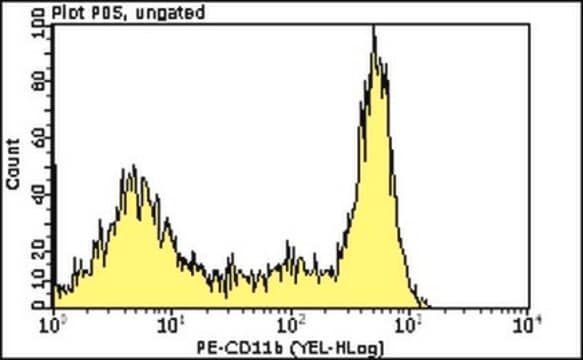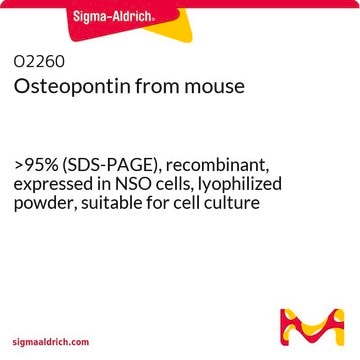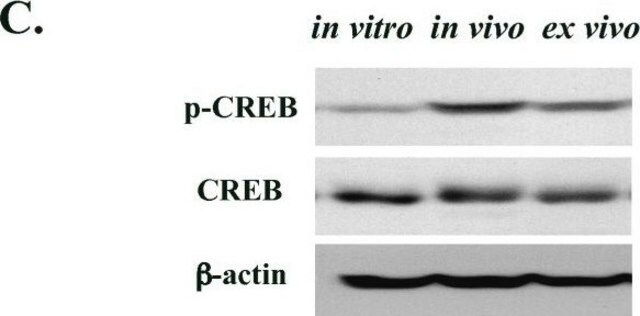499260
Osteopontin, His•Tag®, Mouse, Recombinant, Mouse
Synonyma:
rmOPN
Přihlásitk zobrazení cen stanovených pro organizaci a smluvních cen
About This Item
UNSPSC Code:
12352202
NACRES:
NA.45
Doporučené produkty
assay
≥95% (SDS-PAGE)
Quality Level
form
lyophilized
manufacturer/tradename
Calbiochem®
storage condition
OK to freeze
impurities
≤100 pg/μg Endotoxins (pg/μg rmOPN)
shipped in
ambient
storage temp.
−70°C
General description
M.W. 65,000 and 30,000 under reducing conditions.
Recombinant, mouse osteopontin fused at the C-terminus to a His•Tag sequence and expressed in NSO-derived Leu17-Asn294 (Glu99Gly) murine myeloma cells. A secreted, highly acidic, Ca2+-binding, RGD-containing, phosphorylated glycoprotein. Chemotactic for macrophages, smooth muscle cells, endothelial cells, and glial cells. Has been shown to inhibit nitric oxide production and cytotoxicity by activated macrophages. Plays a significant role in inducing granulomas of various origin. OPN is also involved in the migration of embryonic fibroblasts, macrophages, and metastatic cells.
Recombinant, mouse osteopontin fused at the C-terminus to a His•Tag sequence and expressed in NSO-derived Leu17-Asn294 (Glu99Gly) murine myeloma cells. A secreted, highly acidic, calcium-binding, RGD-containing, phosphorylated glycoprotein. Osteopontin is expressed in several cell types including macrophages, fibroblasts, epithelial cells, T cells and osteoclasts in response to activation by cytokines, growth factors or inflammatory mediators. Mouse OPN cDNA encodes a 294 amino acid protein that has a 16 amino acid predicted signal peptide, which is cleaved to generate 278 amino acid mature protein. The mature protein contains an integrin binding arginine-glycine-aspartic acid (RGD) sequence. Exhibits some renoprotective actions in renal injury, such as increasing tolerance to acute ischemia, inhibiting inducible nitric oxide synthase, and reducing cell peroxide levels.
Biochem/physiol Actions
~200 ng immobilized osteopontin/well will mediate the adhesion of ≥25% of the 293 cells plated at 10⁵ cells/well
Warning
Toxicity: Standard Handling (A)
Physical form
Lyophilized from 0.2 µm sterile-filtered PBS, 50 µg BSA/µg rmOPN.
Reconstitution
Following reconstitution, aliquot and freeze (-70°C). Stock solutions are stable for up to 1 month at 4°C and for up to 3 months at -70°C. Avoid freeze/thaw cycles of stock solutions.
Reconstitute to ≥100 µg/ml with sterile PBS.
Other Notes
Xie, Y., et al. 2001. Kidney Int.60, 1645.
Chiba, S., et al. 2000. Microbiol. Immunol. 44, 319.
Miyazaki, Y., et al. 1990. J. Biol. Chem. 265, 14432.
Chiba, S., et al. 2000. Microbiol. Immunol. 44, 319.
Miyazaki, Y., et al. 1990. J. Biol. Chem. 265, 14432.
Legal Information
CALBIOCHEM is a registered trademark of Merck KGaA, Darmstadt, Germany
HIS TAG is a registered trademark of Merck KGaA, Darmstadt, Germany
Storage Class
11 - Combustible Solids
wgk_germany
WGK 1
flash_point_f
Not applicable
flash_point_c
Not applicable
Osvědčení o analýze (COA)
Vyhledejte osvědčení Osvědčení o analýze (COA) zadáním čísla šarže/dávky těchto produktů. Čísla šarže a dávky lze nalézt na štítku produktu za slovy „Lot“ nebo „Batch“.
Již tento produkt vlastníte?
Dokumenty související s produkty, které jste v minulosti zakoupili, byly za účelem usnadnění shromážděny ve vaší Knihovně dokumentů.
Kristen Johnson et al.
Journal of bone and mineral research : the official journal of the American Society for Bone and Mineral Research, 18(6), 994-1004 (2003-06-24)
Osteopontin and PP(i) both suppress hydroxyapatite deposition. Extracellular PP(i) deficiency causes spontaneous hypercalcification, yet unchallenged osteopontin knockout mice have only subtle mineralization abnormalities. We report that extracellular PP(i) deficiency promotes osteopontin deficiency and correction of osteopontin deficiency prevents hypercalcification, suggesting
Náš tým vědeckých pracovníků má zkušenosti ve všech oblastech výzkumu, včetně přírodních věd, materiálových věd, chemické syntézy, chromatografie, analytiky a mnoha dalších..
Obraťte se na technický servis.








